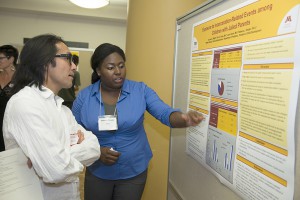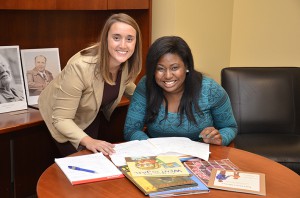For most of her life, JaLeesa Wright has been enamored with birds. She draws them, paints them, even ponders their very essence. And now she sees the birds—and her art—as symbols of her newfound love of research.

“If you asked me at age five what I wanted to be, it probably was a bird of some sort,” says Wright, a senior majoring in family social science with a minor in gender, women, and sexuality studies. “I saw birds as being a symbol of freedom. My research, in a way, embodies that. No matter the circumstances that you’ve gone through, you can still take flight.”
Her academic aspirations are on an upward trajectory, thanks to her participation in the McNair Scholars program—a 10-week summer research apprenticeship. Named after astronaut Ronald McNair, who died in the 1986 Challenger explosion, the scholarship is designed to get more first-generation and underrepresented college students on a path to a doctoral degree.
Wright’s research topic, on display at a lively and crowded poster session at Coffman Union last summer, was titled “Exposure to Incarceration-Related Events Among Children with Jailed Parents.” She collaborated with her McNair adviser, assistant professor of pediatrics Rebecca Shlafer, ’10, to study—in samples of children with jailed parents—children’s exposure to incarcerated-related events, such as witnessing their parents’ arrests, and their common emotional reactions to those events.
It’s a topic that hits home for Wright. When she was a youth, her mom and stepdad were incarcerated for short periods on three different occasions.
The art of research
Wright is now planning to pursue a Ph.D. in human development and family studies and obtain licensure in marriage and family therapy. Her targeted vision of the future is due in part to the guidance and support of Shlafer, who has a Ph.D. from the Institute of Child Development.

Shlafer remembers the moment when she and Wright honed in on a set of questions that seemed doable for a summer research project.
“I think that there is a sweet spot in this program in trying to find a research question that adds a meaningful piece to the literature, and can be done in such a short amount of time and with a generally research-naive scholar,” she says. “To find that, from my perspective as a mentor, was awesome. I’m pretty sure we high-fived when that moment happened.”
And as her McNair experience gained momentum, an enthusiastic Wright began viewing research as more than just a mass accumulation of data.
“I really started to see it as an art, and it was because of all the editing we had to do,” she says. “The first time I sent Rebecca my work, I’m not going to lie, I was very nervous…And I looked at the critiques and I thought, ‘Oh my goodness, this is terrible, because there are so many comments and so many things I have to change.’
“But through that, I understood that any work that you’re going to produce in this field has to be edited, has to be revised plenty of times over. I really started to see research as an art, putting these pieces together to create a full picture to present to the public.”
A program that maximizes potential
The McNair Scholars program not only prepares students for graduate school and beyond, “it helps them maximize their time in their last year or two of college,” says Anthony Albecker, director of the program since 2012, who himself was a low-income, first-generation student. “As we look at trying to bolster and diversify those going on to get advanced degrees, this serves as an important pipeline for students.”
“I see McNair as this wonderful opportunity,” adds Shlafer. “I think it’s about providing students with a rich and meaningful chance to learn about the research process and, perhaps more importantly, build a meaningful relationship with a faculty mentor.”
Wright is continuing to work with Shlafer this academic year, logging about six hours in her lab each week, plus observing children’s visits with their parents at two local jails. Wright also will be applying for the Undergraduate Research Opportunities Program (UROP) in the spring.
Watching Shlafer and Wright interact, it’s clear that mentor and mentee share a special bond.
“I would say Rebecca is one of the most caring and respectful people that I have met during my undergraduate experience,” says Wright. “Caring in the sense that you can come in here and you can talk to her about your personal problems—have that conversation—but then we’re on to talking about research. I like how she’s able to balance that. She’s able to keep it professional, but then she’s also able to relate to her students and tell them, ‘I do appreciate your work.’ I love that. Credit is always given where credit is due.”
Credit Wright with another insightful analogy on research and birds, small and large. In addition to her art, she loves to go to Fort Snelling, sit atop the bluff, and watch the planes go by.
“I see research as giving me the ability to see through a bird’s eye—overlooking a population, looking at some things a lot differently than what you would see on the ground.”
Read more about Rebecca Shlafer, and the McNair Scholars Program.
Story by Rick Moore | Photos by Patrick O’Leary and Rick Moore | Winter 2015